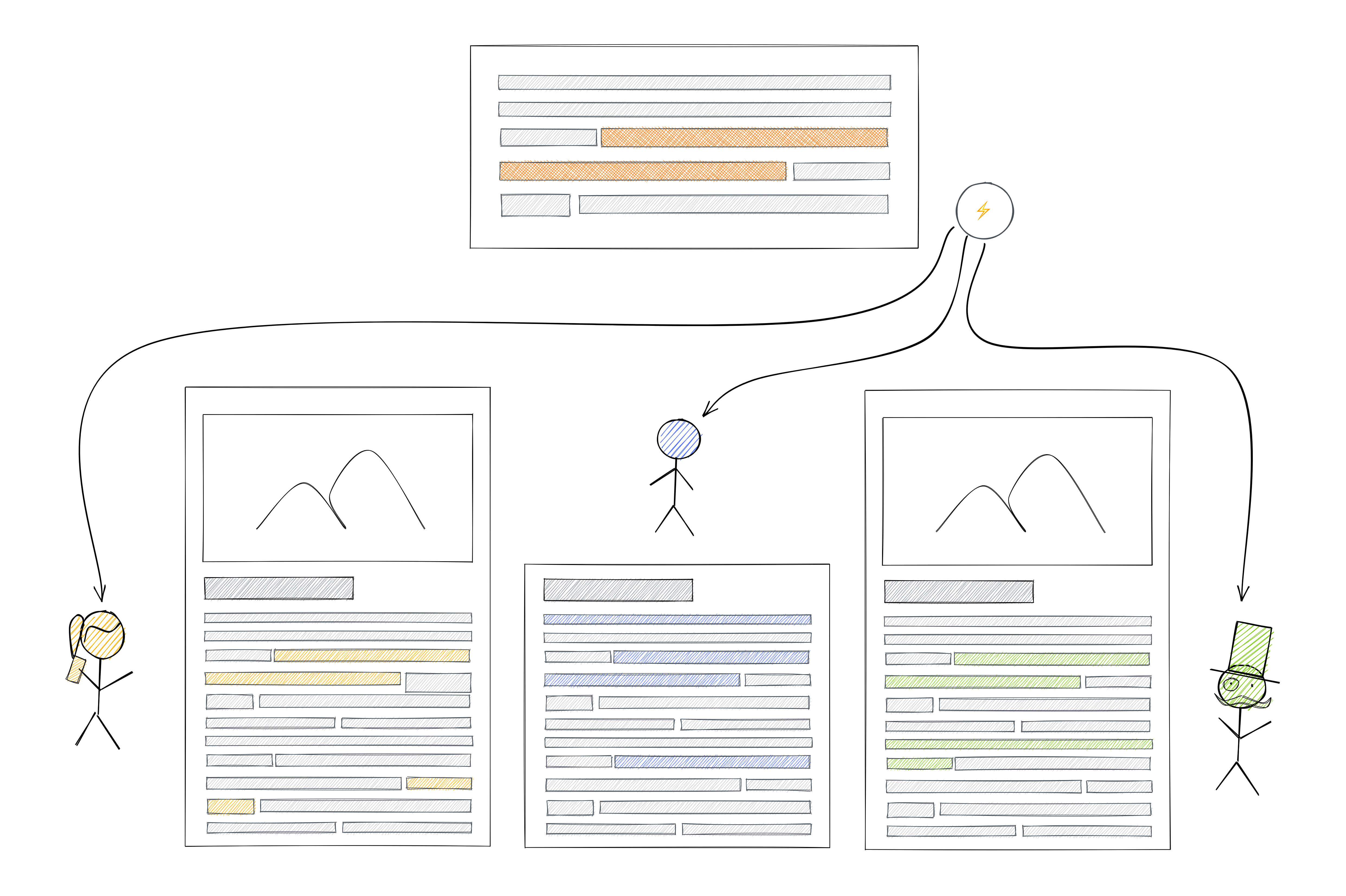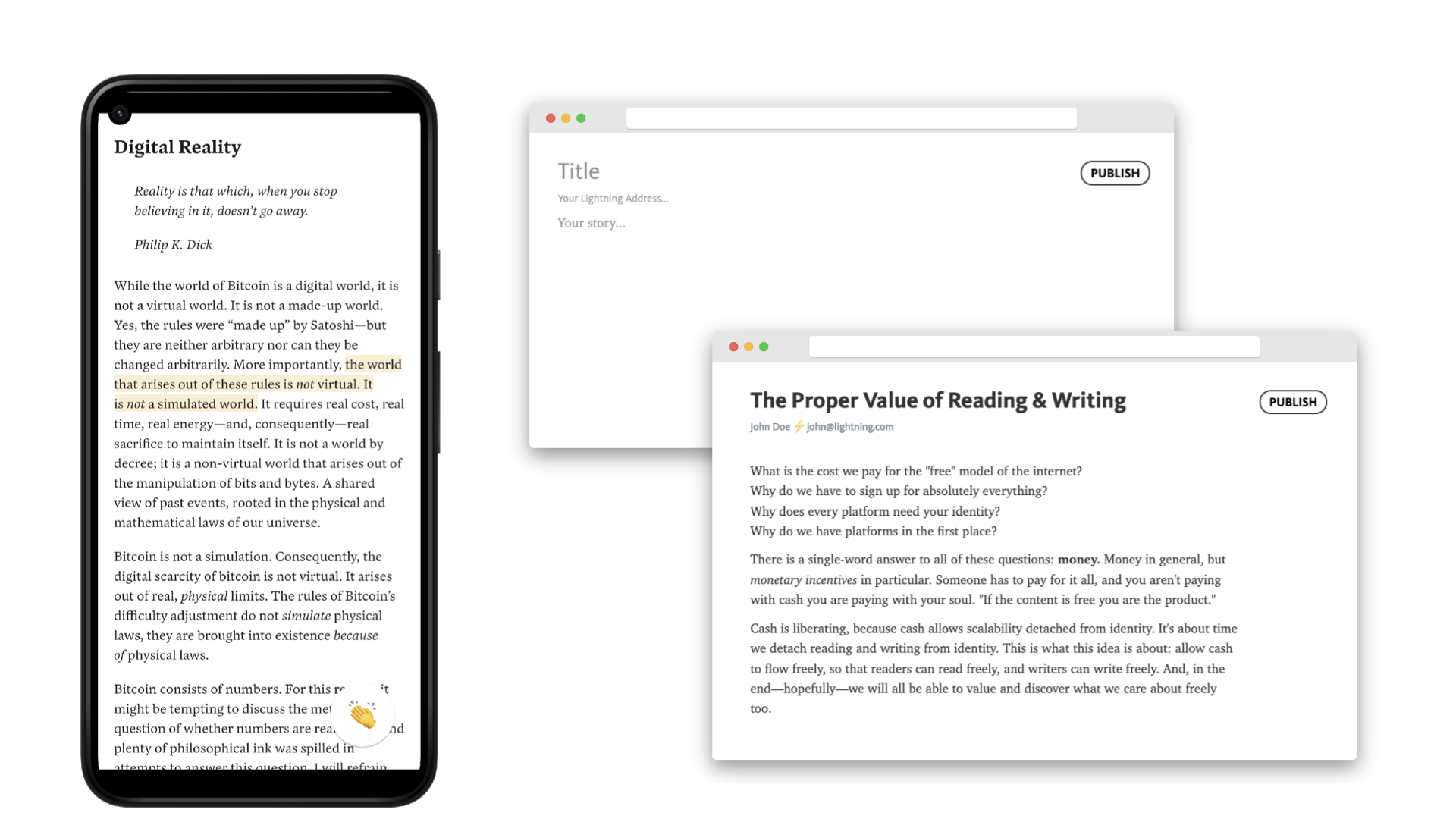Not too long ago, I tried to paint a picture of what a vision for a value-enabled web could look like. Now, only a couple of months later, all this stuff is being built. On nostr, and on lightning. Orange and purple, a match made in heaven.
It goes without saying that I'm beyond delighted. What a time to be alive!
nostr
Here's the thing that nostr got right, and it's the same thing that Bitcoin got right: information is easy to spread and hard to stifle.1 Information can be copied quickly and perfectly, which is, I believe, the underlying reason for its desire to be free.
Easy to spread, hard to stifle. That's the base reality of the nature of information. As always, the smart thing is to work with nature, not against it.2 That's what's beautiful about the orange coin and the purple ostrich: both manage to work with the peculiarities of information, not against them. Both realize that information can and should be copied, as it can be perfectly read and easily spread, always. Both understand that resistance to censorship comes from writing to many places, making the cost of deletion prohibitive.
Information does not just want to be free, it longs to be free. Information expands to fill the available storage space. Information is Rumor's younger, stronger cousin; Information is fleeter of foot, has more eyes, knows more, and understands less than Rumor.
<cite>Eric Hughes, A Cypherpunk's Manifesto</cite>
Nostr is quickly establishing itself as a base layer for information exchange, one that is identity-native and value-enabled. It is distinctly different from systems that came before it, just like Bitcoin is distinctly different from monies that came before it.
As of today, the focus of nostr is mostly on short text notes, the so-called "type 1" events more commonly known as tweets.3 However, as you should be aware by now, nostr is way more than just an alternative to twitter. It is a new paradigm. Change the note kind from 1 to 30023 and you don't have an alternative to Twitter, but a replacement for Medium, Substack, and all the other long-form platforms. I believe that special-purpose clients that focus on certain content types will emerge over time, just like we have seen the emergence of special-purpose platforms in the Web 2.0 era. This time, however, the network effects are cumulative, not separate. A new paradigm.
Let me now turn to one such special-purpose client, a nostr-based reading app.
Reading
I'm constantly surprised that, even though most people do read a lot online, very few people seem to have a reading workflow or reading tools.
Why that is is anyone's guess, but maybe the added value of such tools is not readily apparent. You can just read the stuff right there, on the ad-ridden, dead-ugly site, right? Why should you sign up for another site, use another app, or bind yourself to another closed platform?
That's a fair point, but the success of Medium and Substack shows that there is an appetite for clean reading and writing, as well as providing avenues for authors to get paid for their writing (and a willingness of readers to support said authors, just because).
The problem is, of course, that all of these platforms are platforms, which is to say, walled gardens that imprison readers and writers alike. Worse than that: they are fiat platforms, which means that permissionless value-flows are not only absent from their DNA, they are outright impossible.4
Nostr fixes this.

The beauty of nostr is that it is not a platform. It's a protocol, which means that you don't have to sign up for it---you can create an identity yourself. You don't have to ask for permission; you just do, without having to rely on the benevolence of whatever dictator is in charge of the platform right now.
Nostr is not a platform, and yet, powerful tools and services can be built and monetized on top of it. This is good for users, good for service providers, and good for the network(s) at large. Win-win-win.
So what am I talking about, exactly? How can nostr improve everyone's reading (and writing) experience?
Allow me to paint a (rough) picture of what I have in mind. Nostr already supports private and public bookmarks, so let's start from there.
Imagine a special-purpose client that scans all your bookmarks for long-form content.5 Everything that you marked to be read later is shown in an orderly fashion, which is to say searchable, sortable, filterable, and displayed without distractions. Voilà, you have yourself a reading app. That's, in essence, how Pocket, Readwise, and other reading apps work. But all these apps are walled gardens without much interoperability and without direct monetization.
Bitcoin fixes the direct monetization part.6 Nostr fixes the interoperability part.
Alright, we got ourselves a boring reading app. Great. Now, imagine that users are able to highlight passages. These highlights, just like bookmarks now, could be private or public. When shared publicly, something interesting emerges: an overlay on existing content, a lens on the written Web. In other words: swarm highlights.
Imagine a visual overlay of all public highlights, automatically shining a light on what the swarm of readers found most useful, insightful, funny, etc.

Further, imagine the possibility of sharing these highlights as a "type 1" event with one click, automatically tagging the highlighter(s)---as well as the author, of course---so that eventual sat-flows can be split and forwarded automatically.

Voilà, you have a system that allows for value to flow back to those who provide it, be it authors, editors, curators, or readers that willingly slog through the information jungle to share and highlight the best stuff (which is a form of curation, of course).
Zaps make nostr a defacto address book7 of payment information, which is to say lightning addresses, as of now. Thanks to nostr wallet connect (among other developments), sending sats ~~will soon be~~ is already as frictionless as leaving a like.
Value-for-value and participatory payment flows are something that traditional reading apps desperately lack, be it Pocket, Instapaper, Readwise, or the simple reading mode that is part of every browser.
A neat side-effect of a more structured way to share passages of text is that it enables semi-structured discussions around said passages---which could be another useful overlay inside special-purpose clients, providing context and further insights.8
Further, imagine the option of seamlessly switching from text-on-screen to text-to-speech, allowing the user to stream sats if desired, as Podcasting 2.0 clients already do.9
Imagine user-built curations of the best articles of the week, bundled neatly for your reading pleasure, incentivized by a small value split that allows the curator to participate in the flow of sats.
You get the idea.
I'm sure that the various implementation details will be hashed out, but as I see it, 90% of the stuff is already there. Maybe we'll need another NIP or two, but I don't see a reason why this can't be built---and, more importantly: I don't see a reason why it wouldn't be sustainable for everyone involved.
Most puzzle pieces are already there, and the rest of them can probably be implemented by custom event types. From the point of view of nostr, most everything is an event: bookmarks are events, highlights are events, marking something as read is an event, and sharing an excerpt or a highlight is an event. Public actions are out in the open, private actions are encrypted, the data is not in a silo, and everyone wins. Especially the users, those who are at the edge of the network and usually lose out on the value generated.
In this case, the reading case, the users are mostly "consumers" of content. What changes from the producing perspective, the perspective of the writer?
Writing
Back to the one thing that nostr got right: information is easy to spread but hard to stifle. In addition to that, digital information can be copied perfectly, which is why it shouldn't matter where stuff is published in the first place.
Allow me to repeat this point in all caps, for emphasis: IT SHOULD NOT MATTER WHERE INFORMATION IS PUBLISHED, and, maybe even more importantly, it shouldn't matter if it is published in a hundred different places at once.10
What matters is trust and accuracy, which is to say, digital signatures and reputation. To translate this to nostr speak: because every event is signed by default, as long as you trust the person behind the signature, it doesn't matter from which relay the information is fetched.
This is already true (or mostly true) on the regular web. Whether you read the internet archive version of an article or the version that is published by an online magazine, the version on the author's website, or the version read by some guy that has read more about Bitcoin than anyone else you know11---it's all the same, essentially. What matters is the information itself.
Practically speaking, the source of truth in a hypernostrized world is---you guessed it---an event. An event signed by the author, which allows for the information to be wrapped in a tamper-proof manner, which in turn allows the information to spread far and wide---without it being hosted in one place.
The first clients that focus on long-form content already exist, and I expect more clients to pop up over time.12 As mentioned before, one could easily imagine prism-like value splits seamlessly integrated into these clients, splitting zaps automatically to compensate writers, editors, proofreaders, and illustrators in a V4V fashion. Further, one could imagine various compute-intensive services built into these special-purpose clients, such as GPT Ghostwriters, or writing aids such as Grammarly and the like. All these services could be seamlessly paid for in sats, without the requirement of any sign-ups or the gathering of any user data. That's the beauty of money proper.

Plagiarism is one issue that needs to be dealt with, of course. Humans are greedy, and some humans are assholes. Neither bitcoin nor nostr fixes this. However, while plagiarism detection is not necessarily trivial, it is also not impossible, especially if most texts are published on nostr first. Nostr-based publishing tools allow for OpenTimestamp attestations thanks to NIP-03, which in turn allows for plagiarism detection based on "first seen" lookups.
That's just one way to deal with the problem, of course. In any case, I'm confident that we'll figure it out.
Value
I believe that in the open ~~attention~~ information economy we find ourselves in, value will mostly derive from effective curation, dissemination, and transmission of information, not the exclusive ownership of it.
Although it is still early days, the statistics around Podcasting 2.0 and nostr zaps clearly show that (a) people are willing to monetarily reward content they care about, and (b) the willingness to send sats increases as friction decreases.
The ingenious thing about boostagrams and zaps is that they are direct and visible, which is to say, public and interactive. They are neither regular transactions nor simple donations---they are something else entirely. An unforgable value signal, a special form of gratitude and appreciation.
Contrast that with a link to Paypal or Patreon: impersonal, slow, indirect, and friction-laden. It's the opposite of a super-charged interaction.
While today's information jungle increasingly presents itself in the form of (short) videos and (long-form) audio, I believe that we will see a renaissance of the written word, especially if we manage to move away from an economy built around attention, towards an economy built upon value and insight.
The orange future now has a purple hue, and I believe that it will be as bright as ever. We just have a lot of building to do.
Further Reading
NIPs and Resources
- Nostr Resources
- value4value.info
- nips.be
- NIP-23: Long-form content
- NIP-57: Event-specific zap markers
- NIP-47: Nostr Wallet Connect
- NIP-03: OpenTimestamps attestations for events
Originally published on dergigi.com
- That's a Satoshi quote, of course: "Bitcoin's solution is to use a peer-to-peer network to check for double-spending. In a nutshell, the network works like a distributed timestamp server, stamping the first transaction to spend a coin. It takes advantage of the nature of information being easy to spread but hard to stifle."
- Paywalls work against this nature, which is why I consider them misguided at best and incredibly retarded at worst.
- Refer to the various NIPs to discover the multitude of event kinds defined by the protocol.
- Fiat doesn't work for the value-enabled web, as fiat rails can never be open and permissionless. Digital fiat is never money. It is---and always will be---credit.
- In the nostr world long-form content is simply markdown as defined in NIP-23, but it could also be a link to an article or PDF, which in turn could get converted into markdown and posted as an event to a special relay.
- ...because Bitcoin makes V4V practical. (Paywalls are not the way.)
- The Yellow Pages are dead, long live The Purple Pages!
- Use a URI as the discussion base (instead of a highlight), and you got yourself a Disqus in purple feathers!
- Whether the recipient is a text-to-speech service provider or a human narrator doesn't even matter too much, sats will flow just the same.
- That's what torrents got right, and ipfs for that matter.
- There is only one such guy, as we all know, and it's this Guy: TheGuySwann (npub1h8n…rpev)
- BlogStack and Habla being two of them.
